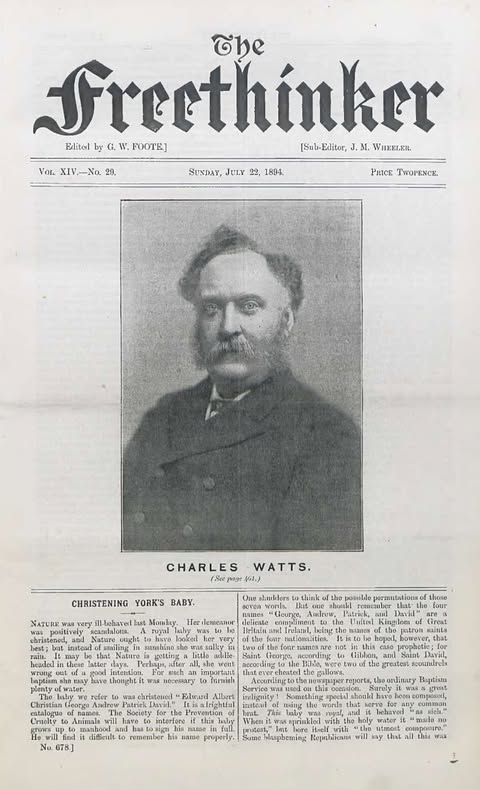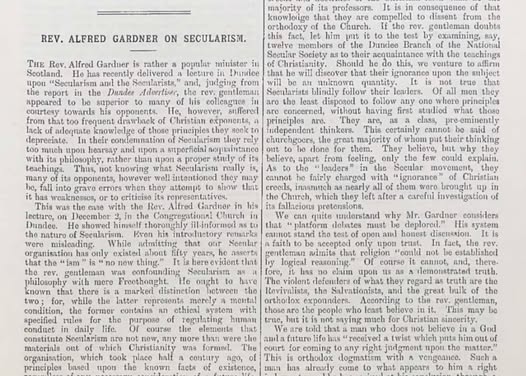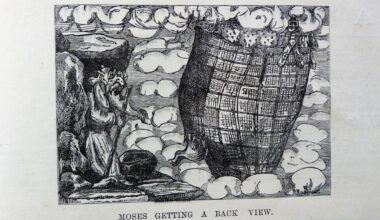Editor’s Introduction
While perusing the Freethinker historical archive for Dundee-related material in preparation for my talk to the Dundee Humanist Group on 10 February, I came across an interesting article in the 23 December 1894 issue. Written by Charles Watts (1836-1906), it is a defence of ‘Secularism’ from a clerical critique by the Rev. Alfred Gardner.
I found the article interesting for several reasons. First, I was only vaguely familiar with Watts, a founder of the National Secular Society (NSS) and well-known secularist lecturer, writer, debater, and publisher of the nineteenth century (his events were frequently advertised and reported on in the Freethinker). He is an important figure in freethought history: aside from helping to found the NSS, he was influential in the development of the Rationalist Press Association and his son founded the precursor of today’s New Humanist magazine. Watts travelled widely and was famous in freethought circles in both Britain and Canada.
He was also involved in the controversy over the infamous birth control pamphlet The Fruits of Philosophy. Bob Forder tells the tale of the controversy, and the splits in the secularist movement it precipitated, here. An excerpt:
In 1876, a Bristol bookseller, Henry Cook, was sentenced to two years’ hard labour for selling the pamphlet, because it contained ‘obscene’ illustrations. How obscene we do not know, because no copies have survived, but it seems that the illustrations were Cook’s own and were inserted by him. Despite the fact that Knowlton’s pamphlet had been published for some 44 years, the authorities, their appetites whetted from their success in Bristol, decided to press on and prosecute Charles Watts, who had published it.
To the horror, disgust and fury of Bradlaugh and Besant, Watts pleaded guilty to publishing an obscene book, and thus escaped with a suspended sentence. Watts parted ways with his former colleagues amidst great acrimony. The rift was so great that Watts helped found a rival organisation to the NSS, the British Secular Union, before emigrating to Canada, where he lived until after Bradlaugh’s death. Watts had been a freethought publisher of significance; his departure left something of a void, which Bradlaugh and Besant were soon to fill.
Watts had also been the cover star of the 22 July 1894 issue of the Freethinker, which gave him a glowing profile, concluding: ‘In private Mr. Watts is what his portrait bespeaks him, a genial English man, as pleasant in social intercourse as he is redoubtable in the arena of debate. He has a good physical constitution, and it is a reasonable hope that he may long fight in the van of the army of Freethought.’ (Alas, Watts and the Freethinker would not be on such friendly terms forever. Says Jim Herrick in his 1982 history of the Freethinker: ‘He fell out with [G.W. Foote, the founder and first editor of the Freethinker] a few years before his death, when it was believed he was showing greater loyalty to the Rationalist Press Association…’)

As for the 1894 article itself, I was taken by its relevance to the New Theism debate (see especially the penultimate paragraph) and the familiarity of the religion vs. non-religion arguments contained therein (e.g. Watts notes that nonbelievers are generally more knowledgeable about the Bible than Christians themselves). The god/religion argument has been going on for millennia now, and it evolves, but it seems that some themes recur again and again. Maybe this is a cyclical phenomenon: secularists might win for a while, but they have to return to the field whenever religion obnoxiously, and perhaps inevitably, reasserts itself. The New Atheist moment of the 2000s seemed to fade away, but now, with the New Theism, the argument must be taken up once more. This is a forever war—and I confess that I don’t mind it at all.
Watts’s much broader conception of ‘Secularism’ (always capitalised) is worth noting, too. He argues that Gardner confuses ‘Secularism as a philosophy with mere Freethought’:
He ought to have known that there is a marked distinction between the two; for, while the latter represents merely a mental condition, the former contains an ethical system with specified rules for the purpose of regulating human conduct in daily life.
Is Watts’s ‘Secularism’ what we now mean by (organised) humanism? Is secularism now ‘mere Secularism’? If so, what of free thought? In 1896, the Freethinker, quoting the Dundee Advertiser, informs us that Watts was involved in ‘the public naming of a child according to the ceremony of the Secular Society, to the Dundee Branch of which the parents of the child belong.’ Evidently, the word ‘secularism’ used to denote a much broader, non-religious philosophical life stance than it usually does now. Can you imagine the current NSS conducting such ceremonies? That sort of thing is really a humanist (or ‘Humanist’) monopoly these days.
Leaving those reflections behind, I reproduce Watts’s article below. I have retained the original punctuation, spelling, formatting, and grammar. I hope you find it as worthwhile as I did. For me, it’s a reminder that there is treasure indeed to be found in our archive.
REV. ALFRED GARDNER ON SECULARISM
The Rev. Alfred Gardner is rather a popular minister in Scotland. He has recently delivered a lecture in Dundee upon “Secularism and the Secularists,” and, judging from the report in the Dundee Advertiser, the rev. gentleman appeared to be superior to many of his colleagues in courtesy towards his opponents. He, however, suffered from that too frequent drawback of Christian exponents, a lack of adequate knowledge of those principles they seek to depreciate. In their condemnation of Secularism they rely too much upon hearsay and upon a superficial acquaintance with its philosophy, rather than upon a proper study of its teachings. Thus, not knowing what Secularism really is, many of its opponents, however well-intentioned they may be, fall into grave errors when they attempt to show that it has weaknesses, or to criticise its representatives.
This was the case with the Rev. Alfred Gardner in his lecture, on December 2, in the Congregational Church in Dundee. He showed himself thoroughly ill-informed as to the nature of Secularism. Even his introductory remarks were misleading. While admitting that our Secular organisation has only existed about fifty years, he asserts that the “ism” is “no new thing.” It is here evident that the rev. gentleman was confounding Secularism as a philosophy with mere Freethought. He ought to have known that there is a marked distinction between the two; for, while the latter represents merely a mental condition, the former contains an ethical system with specified rules for the purpose of regulating human conduct in daily life. Of course the elements that constitute Secularism are not new, any more than were the materials out of which Christianity was formed. The organisation, which took place half a century ago, of principles based upon the known facts of existence, regardless of any necessary consideration of a future life, was the initiation of the philosophy of Secularism. Its marvellous development during the last fifty years is a striking instance of the power of thought when it is kept free from theological restrictions. Within this period mental liberty and a practical view of life have progressed more rapidly than either was permitted to do under centuries of Christian rule. This is not merely a matter of opinion, but a fact of history.
The value of the rev. gentleman’s criticism may be estimated from some of his remarks, which are reported as follows: “The greater number of Secularists rejected the Christian creed out of pure ignorance; they were at the mercy of their papers and more violent leaders. In others Secularism seemed to spring from nothing but pure contrariness of disposition. . . . . Any one who had witnessed platform debates—and these must be deplored—must remember many scenes of that kind. The man who became violent in defence of the truth was always the one who the least believed in it. When a man told them he believed there was no God and no future life, that pointed to his having received a twist which put him out of court for coming to any right judgment on the matter. If it was difficult to prove the being of God, it was not less difficult to disprove it; and which assumption seemed the more probable—that God existed or did not exist? So natural and rational a thing was it to believe in God and his beneficence that only by overwhelming evidence could any belief to the contrary be maintained. . . . . As religion was not, and could not be, established by logical reasoning, it could not be overthrown by logical reasoning. Secularists talked a good deal about the elevation of humanity, and were always taunting Christians about forgetting this present world in their care for the world to come. Where, he asked, were the Secularists’ missions in the slums among the poor and degraded of mankind? They could offer no encouragement for the fallen spirit, no balm for the broken heart, and no healing for the wounded conscience.”
We have given the Rev. A. Gardner’s words at length, because we desire our readers to know exactly what he said. It is, indeed, news to us to be told that ignorance is the cause of Secularists rejecting Christianity. Our experience is that, as a rule, Secularists know more of the creeds and doctrines of the Christian faith than do the majority of its professors. It is in consequence of that knowledge that they are compelled to dissent from the orthodoxy of the Church. If the rev. gentleman doubts this fact, let him put it to the test by examining, say, twelve members of the Dundee Branch of the National Secular Society as to their acquaintance with the teachings of Christianity. Should he do this, we venture to affirm that he will discover that their ignorance upon the subject will be an unknown quantity. It is not true that Secularists blindly follow their leaders. Of all men they are the least disposed to follow any one where principles are concerned, without having first studied what those principles are. They are, as a class, pre-eminently independent thinkers. This certainly cannot be said of churchgoers, the great majority of whom put their thinking out to be done for them. They believe, but why they believe, apart from feeling, only the few could explain. As to the “leaders” in the Secular movement, they cannot be fairly charged with “ignorance” of Christian creeds, inasmuch as nearly all of them were brought up in the Church, which they left after a careful investigation of its fallacious pretensions.
We can quite understand why Mr. Gardner considers that “platform debates must be deplored.” His system cannot stand the test of open and honest discussion. It is a faith to be accepted only upon trust. In fact, the rev. gentleman admits that religion “could not be established by logical reasoning.” Of course it cannot, and, therefore, it has no claim upon us as a demonstrated truth. The violent defenders of what they regard as truth are the Revivalists, the Salvationists, and the great bulk of the orthodox expounders. According to the rev. gentleman, those are the people who least believe in it. This may be true, but it is not saying much for Christian sincerity.
We are told that a man who does not believe in a God and a future life has “received a twist which puts him out of court for coming to any right judgment upon the matter.” This is orthodox dogmatism with a vengeance. Such a man has already come to what appears to him a right judgment; and he has arrived at his conclusion through a reasoning process, which the God-believer, who has not studied the pros and cons, has not done. Surely the person who relies upon logical reasoning is more likely to be right than the one who is satisfied with mere speculation. As to the difficulty of disproving the existence of God, that has no bearing on Secularism, for the reason that it does not require its adherents to try the experiment. That it is “natural and rational to believe in God and his beneficence” is another matter. We fail to see any proof of great beneficence in the misery, disorder, and injustice that so extensively prevail, any more than in the many earthquakes, volcanoes, etc., that are constantly devastating whole villages, and destroying the lives of thousands of men, women, and innocent children. This may be the “beneficence” of a God, but it would not be the work of a good man.
The whole mission of Secularism is to raise the “poor and degraded” from “the slums,” and we should have succeeded in this work more fully than we have done but for the fact that Christians have robbed us again and again of money that has been left us to carry on our work. But we do more than try to raise those who have fallen; we seek to improve conditions so that there should be no “slums” for anyone to fall into. For two thousand years Christianity has been at work, and the existing “poor and degraded” of the “slums” are painful proofs of its utter failure as a remedial force. Talk of “balm for the broken heart,” and “healing for the wounded conscience”! Christianity offers compensation in another world for the wrongs endured in this, and the forgiveness of Christ for a career of wickedness and crime. Secularism says that the most lasting and dignified “balm” is to be found in right doing—that is, in practising truth, honor, sobriety, industry, and fidelity; these are the virtues that Secularism inculcates, and their practical use would “heal the broken heart” and the “wounded conscience” in this life, and would also prevent such miseries from blighting the happiness of existence.
The rev. gentleman asserts that Christianity has influenced Secularism; but the fact is that it is Secularism that has influenced Christianity, compelling it to entirely modify its character. It can no longer persecute with impunity as it once did, neither can it teach openly, as was done in former times, its barbarous doctrines of natural depravity and eternal torments. The Secular spirit of the age has forced it in this particular to “assume a virtue if it has it not.” We are told that in an un-Christian country Secularism would produce a very different aspect to what it does in England. There is some truth in this, for it would then be enabled to manifest its legitimate power, free from orthodox bigotry and theological restrictions. If Christianity were tried for the first time in a country governed by Secular principles, it would not, we believe, last a single generation.
The limits allowed for this article have already been exhausted, therefore we will but add that, if the Rev. A. Gardner is ready to thoroughly discuss the question, we undertake to prove that Christianity is illogical in its teachings, that it has failed to regenerate society, and that Secularism contains the real elements of a progressive civilisation.
Related reading
From the archive: ‘A House Divided’, by Nigel Sinnott
Books from Bob’s Library #4: The ‘Freethinker’—over a century of issues now available as a digital archive, by Bob Forder
Charles Bradlaugh and George Jacob Holyoake: their contrasting reputations as Secularists and Radicals, by Edward Royle
Review of ‘A Dirty, Filthy Book’ by Michael Meyer, by Bob Forder
Freethought and secularism, by Bob Forder
Atheism, secularism, humanism, by A.C. Grayling
Image of the week: the Freethinker on the British Humanist Association, 1967, by Emma Park
Humanists and ethical reform in mid-twentieth-century Britain, by Charlie Lynch
What I believe: Interview with Andrew Copson, by Emma Park









Your email address will not be published. Comments are subject to our Community Guidelines. Required fields are marked *
Donate